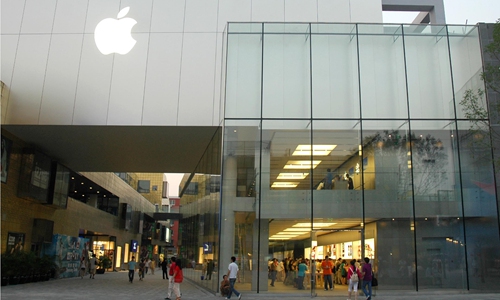Apple to build a Chinese mainland-focusing supply chain: experts
By Yin Yeping Source: Global Times Published: 2020/8/5 20:13:41

File photo: Apple Store Sanlitun in Beijing photo: cnsphoto
Apple is likely to seek to construct a more China market-oriented supply chain in a bid to reduce risks of disruption stemming from the deterioration in China-US relations, industry experts said.
This came after the Taiwan-based Digitimes reported Tuesday that Apple seems to be expecting to establish a supply chain with Chinese mainland-based iPhone producers, serving specifically the mainland market.
Luxshare Precision (Luxshare) has already taken over manufacturing plants in the Chinese mainland from Taiwan's Wistron. Luxshare and another Chinese company, Lens Technology, are reportedly also looking to buy metal chassis plants from Taiwanese firms, as they seek to expand their presence in the iPhone ecosystem, the report said.
"It is feasible for Apple to make such an industrial adjustment and shift its supply chain to Chinese mainland ," Hong Tao, director of the Institute of Business Economics at Beijing Technology and Business University, told the Global Times on Wednesday.
After the COVID-19 outbreak and the China-US trade conflict which was started by the US government, the industrial and supply chains are in the process of adjustment and reconstruction, experts said.
"For Apple to make such an adjustment would be a wise thing to do in order to overcome the fallout from the global pandemic and the tensions over the international political atmosphere," Hong said, adding that different from some countries, the Chinese government is providing a stable and friendly business environment and regulatory support.
Apple did not respond to a request for comment as of press time.
Shenzhen-based Luxshare, which supplies AirPods, said on July 17 that it would buy Wistron's iPhone manufacturing business for $472 million. When the deal closes, Luxshare will own Wistron's factory in Kunshan, East China's Jiangsu Province, which could make it the first original equipment manufacturer (OEM) for the iPhone in the Chinese mainland.
Wistron is currently one of only three iPhone OEMs, smaller than Pegatron and Foxconn, Southern Metropolis Daily reported on July 24.
Liang Zhenpeng, an industry analyst, told the Global Times that it would be easier for Apple to shift more to Chinese mainland since its biggest production line is located in China.
However, Liang noted that Wistron primarily does complete assembly for iPhones, but in order to make a mobile, there are hundreds of components involved and the parts factories are not always in the Chinese mainland but in other countries and regions including South Korea and China's Taiwan.
There is a possibility for a more focused distribution of the supply chain for Apple to lessen the risks of the global uncertainty, but that would take time, Liang said.
RELATED ARTICLES: